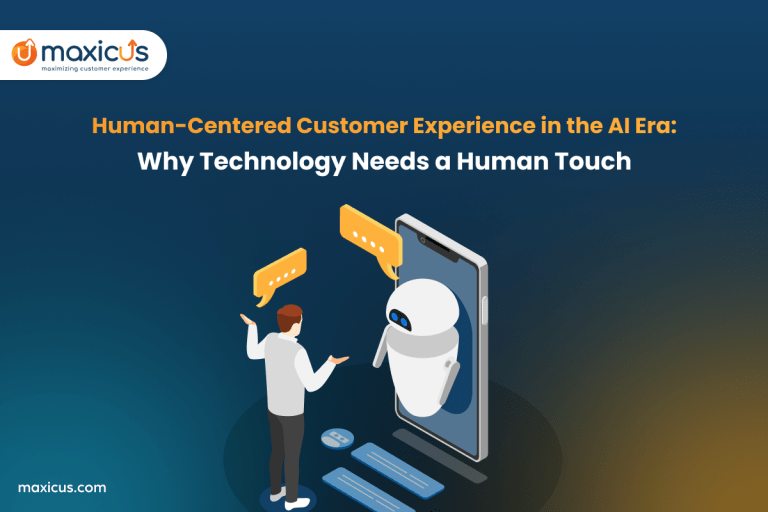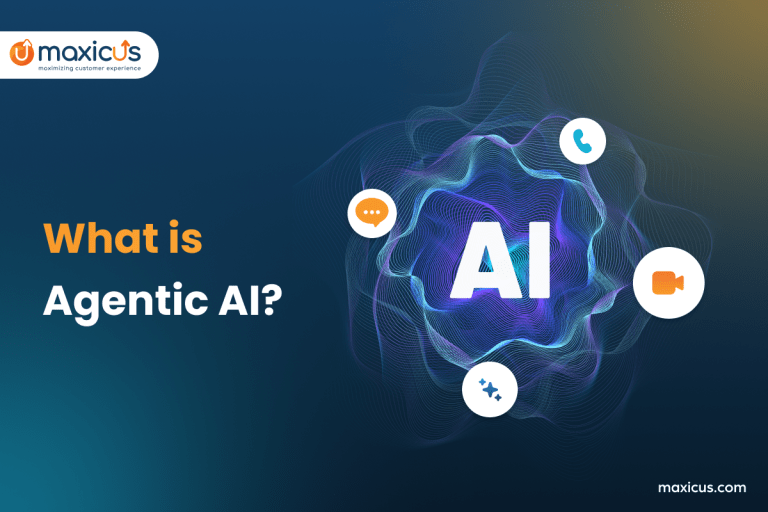The Role of AI in Customer Service
Any business leader will tell you that providing an amazing customer experience (CX) is a key goal for a company, regardless of industry. Studies suggest that up to 42% of B2C customers expressed increased interest in purchasing after receiving good customer service. Further, 52% of them stopped buying because of a single bad customer service experience.
Businesses are embracing technology to give customers consistent service and experience. Artificial intelligence (AI) is revolutionizing customer service by improving consumer engagement and delivering 24/7 customer care. It not only transforms customer service but also boosts consumer loyalty and brand awareness.
In this blog, we will discuss everything about automated customer service and AI’s role in improving customer experience.
Applications of AI and Process Automation in Customer Service
The intriguing aspect of AI is the breadth of its application possibilities. Here are some common—and not-so-common—roles of AI in customer service:
1. Chatbot-based customer support
Small and large businesses are expanding their customer services (while holding prices down) by deploying intelligent chatbots, which is one of the primary roles of ai powered customer support.
60% of online clients dislike waiting longer than 60 seconds for an answer to their inquiry. Chatbots are minimizing client wait times and providing faster answers to their questions, increasing consumer loyalty.
Chatbots can not only deliver timely replies with lightning-fast real-time responses, but they can also relieve the pressure on human agents by addressing a large number of consumer inquiries with the best accuracy and human-like interaction.
2. Predicting consumer needs
You must have been astounded by how shopping websites and e-commerce apps understand what you want depending on your regular page visits, basket item selection, and social sharing. This is the core of a machine learning model.
Machine learning is fundamental to processing and analyzing big data streams and deciding what actionable insights exist. In customer service, machine learning and predictive analytics can support agents detect common inquiries and responses.
3. 24×7 support availability
Customers want brands to be accessible and responsive at all times of the year. This is where automated customer service comes to the rescue. It enables businesses to provide round-the-clock customer assistance and quickly handle concerns. Customers can have their questions answered 24 hours a day, 7 days a week, without having to wait significant amounts of time for a response. This could be critical for organizations that operate globally and want to improve customer service.
Food chains, for example, can now offer a complete online ordering service. Customers that need to call them usually have an issue, unless they are simply ordering food that does not require human interaction. You can order a pizza at any time without having to speak to a person.
4. Assisting customers in decision making
Nearly 80% of customers think AI-powered chatbots may help them make better purchasing decisions than humans.
Customers nowadays interact with brands across devices, necessitating tailored touchpoints to enhance the customer’s decision-making process.
Automated AI-powered assistants respond to consumer questions quickly, acquire detailed information about the product or service, and provide advice to help customers make the best decisions possible. If the communication between the customer and the chatbot becomes too complicated, it is passed to a human agent.
Moreover, bots can learn from previous interactions and deliver accurate solutions using their machine learning capabilities.
5. Natural language processing
Analyzing consumer interactions used to be a time-consuming process that required numerous teams and resources. Natural language processing (NLP) now overcomes such repetitions, resulting in increased customer satisfaction and efficiency.
NLP is a technique for teaching computers to comprehend human speech. The importance of NLP in customer service is enormous.
Voice intelligence technology can accurately transcribe calls in real time and track keywords and how often they appear in consumer interactions. An agent can satisfy the customers needs more rapidly by analyzing the data for certain trends and themes.
6. Sentiment and advanced analytics
Customer feedback sentiment analysis is a tried-and-true way to assess what customers think of your brand. Text analytics solutions powered by artificial intelligence may assess and categorize input as positive, negative, or neutral. NLP techniques can be used to group all words and extract the most relevant information.
Furthermore, customer experience measures such as Net Promoter Score (NPS) and Consumer Effort Score (CES) can be useful indications of overall customer attitude and perception of the company.
7. Robotic process automation
Many simple operations that an agent used to undertake can be automated using robotic process automation (RPA). For example, automating bots to focus on updating information, resolving incidents, or offering proactive outreach to consumers can substantially cut expenses while also improving efficiency and processing time.
Inquiring with customer service representatives is one of the finest methods to determine where RPA can help. They can probably figure out which processes take the longest or have the most system clicks. Alternatively, they may recommend basic, recurring transactions that do not require the intervention of a human.
Importance of artificial intelligence in customer service
What Does AI Mean for Customer Service?
1. AI introduces massive cost savings
Employing AI-enabled solutions can dramatically reduce customer service costs. Why? Because AI enables your agents to focus on more sophisticated queries while automating those simple, recurrent issues that arise daily.
Ai powered customer support means that over time, you’ll need fewer employees on the floor to provide the same (if not better) service with faster reaction times. Indeed, according to research, chatbots alone are predicted to cut corporate expenditures by more than $8 billion per year in 2022 through operational and manpower savings. These savings can be spent on technology to continue developing better solutions for customers.
2. AI brings reliability
As customers’ needs change, organizations that are committed to providing the highest level of service must combine innovative methods of support to provide undeniable reliability and adaptability. Consumers expect a high level of maturity in the way businesses present service solutions in this technologically advanced day.
When used effectively, AI technology can produce levels of reliability that are difficult to match for human counterparts. Chatbots help overcome all conceivable barriers and pain points encountered when dealing with human customer service employees.
3. AI means precision
When it comes to serving individuals to the best of their abilities, the human brain has limited capability and is frequently plagued by mistakes and errors. AI-assisted service solutions, on the other hand, adhere to set criteria and are highly efficient, resulting in a high-quality client experience with little AHT (Average Handling Time). Businesses may rest assured that their offerings will be error-free and exceedingly satisfying to their clients.
4. AI enables personalization
Predictive personalization gives buyers the impression that each product, service, or brand is customized particularly for them.
AI has the potential to help clients find the right information more quickly. Consumers’ data and important indicators are analyzed, and products or services are recommended to customers depending on their browsing/buying inclinations.
Businesses can focus on individual purchase behaviors and gain a deeper knowledge of each consumer by establishing customer personas. This allows them to send customers relevant content at the right time and through the appropriate channels.
Maximize your outsourcing investment with our insider’s guide to selecting the right partner
Final Thoughts
Excellent customer service can add wings to your business’s success by enhancing customer retention and loyalty. Beyond chatbots and self-service platforms, AI-driven automation is revolutionizing the consumer experience by tailoring product offerings to their specific requirements. Moreover, AI can assist agents in streamlining their workflows and eliminating mundane daily duties.
However, building in-house customer service isn’t always the most practical solution for many firms. In this instance, outsourcing your customer care needs to a customer service provider may be a wise decision.
Excellent client service BPO (business process outsourcers) can help your firm gain such loyalty while also saving you money. Most significantly, partnering with an experienced BPO will relieve you and your staff of the stress of customer support, allowing you and your team to focus on more strategically vital concerns – your product or service, your vision.










